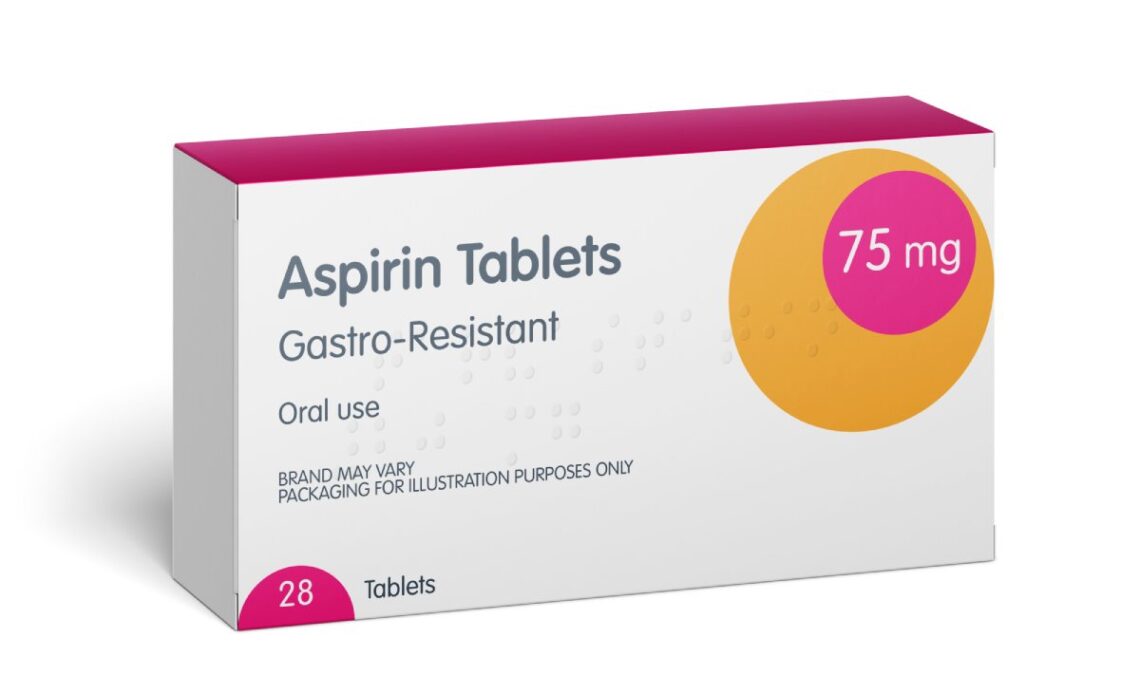
Aspirin Gastro Resistant Tablets 14’S are specially designed tablets that help in pain relief, inflammation reduction, and the prevention of cardiovascular events such as heart attacks and strokes. These tablets are formulated to be gentle on the stomach by preventing direct contact between aspirin (acetylsalicylic acid) and the stomach lining, which can lead to irritation and ulcers.
Each tablet contains 75 mg of aspirin, and the gastro-resistant formulation ensures it is absorbed in the intestine rather than the stomach, minimizing potential side effects.
Product Summary
| Offer Price | ₹ 101.04 |
| Contains | Aspirin / Acetyl Salicylic Acid(75.0 Mg) |
| Uses | To prevent heart attack, stroke |
| Side effects | Swelling, fainting, difficulty in swallowing, rashes, redness |
| Therapy | ANTI-PLATELET |
Uses of Aspirin (Acetylsalicylic Acid)
Aspirin is widely used for several medical purposes, including:
- Pain Relief: Aspirin is effective in alleviating mild to moderate pain, including headaches, toothaches, muscle pain, and menstrual discomfort.
- Anti-inflammatory: It helps in reducing inflammation associated with conditions like arthritis, sprains, and strains.
- Fever Reduction: Aspirin lowers fever, helping to manage symptoms of common colds or other infections.
- Cardiovascular Protection: In lower doses (like 75 mg), aspirin is used to reduce the risk of heart attacks, strokes, and blood clot formation, especially in individuals at high risk.
Side Effects of Aspirin (Acetylsalicylic Acid)
While aspirin is generally safe when used as directed, it can cause side effects, including:
- Upset Stomach: Mild stomach discomfort or indigestion may occur.
- Nausea: Some individuals may feel nauseous after taking aspirin.
- Gastrointestinal Issues: In rare cases, aspirin can cause bleeding or ulcers in the gastrointestinal tract.
- Allergic Reactions: Rash, swelling, and breathing difficulties can occur, especially in individuals sensitive to aspirin or other NSAIDs.
- Tinnitus: Ringing in the ears (usually with higher doses) may also be reported.
Contraindications of Aspirin 75 MG
Certain conditions and factors may make aspirin unsuitable or dangerous for some people. These include:
- Allergy to Aspirin or NSAIDs: Those who have a known allergy to aspirin or other nonsteroidal anti-inflammatory drugs (NSAIDs) should avoid using it.
- Active Gastrointestinal Bleeding or Ulcers: Aspirin can increase the risk of bleeding, so it should not be used in cases of active GI bleeding or ulcers.
- Severe Liver or Kidney Disorders: Aspirin may worsen liver or kidney function in people with severe conditions.
- Third Trimester of Pregnancy: Aspirin should be avoided in the third trimester of pregnancy due to the risk of complications for both the mother and fetus.
Precautions and Warnings of Aspirin 75 MG
Before using aspirin, it’s important to consider the following precautions:
- Asthma: People with asthma, especially those with aspirin-induced asthma, should avoid aspirin.
- Blood Disorders: Aspirin can affect blood clotting, so it should be used with caution in people with bleeding disorders like hemophilia or those on anticoagulant therapy.
- Pregnancy and Breastfeeding: Always consult a doctor before taking aspirin during pregnancy or while breastfeeding.
- Alcohol Consumption: Alcohol can increase the risk of gastrointestinal bleeding and should be limited while using aspirin.
Directions for Use of Aspirin 75 MG
To use Aspirin Gastro Resistant Tablets effectively:
- Dosage: Follow the prescribed dosage from your healthcare provider. For cardiovascular protection, a common dose is 75 mg daily.
- Administration: Take the tablet with water. It’s recommended to take it after food to minimize the risk of stomach upset.
- Do not crush or chew: These tablets are gastro-resistant, meaning they are designed to be absorbed in the intestine, not the stomach. Crushing or chewing may reduce their effectiveness and irritate the stomach.
Storage and Disposal of Aspirin 75 MG
Proper storage is essential to maintain the effectiveness of the medication:
- Storage: Keep Aspirin Gastro Resistant Tablets in a cool, dry place, away from direct sunlight. The ideal temperature is below 25°C.
- Keep out of reach of children: Store the medication safely to prevent accidental ingestion by children.
- Disposal: Do not flush unused or expired tablets down the toilet. Dispose of them according to your local disposal guidelines or take them to a pharmacy for safe disposal.
Quick Tips for Using Aspirin 75 MG
- Consistency: If you are taking aspirin daily for cardiovascular protection, make sure to take it consistently at the same time each day.
- Avoid Self-Dosage Changes: Do not alter your dose without consulting a healthcare provider.
- Monitor for Side Effects: If you experience any unusual symptoms such as persistent stomach pain, black stools, or allergic reactions, seek medical attention immediately.
Dosage of Aspirin 75 MG
The typical dosage of Aspirin Gastro Resistant Tablets 75 mg depends on the condition being treated:
- For Cardiovascular Protection: A common dosage is 75 mg daily, which is effective in reducing the risk of heart attack, stroke, and clot formation.
- For Pain or Inflammation: Higher doses may be required (e.g., 300 mg to 500 mg) for pain relief or inflammatory conditions, but this should be determined by a healthcare provider.
As always, it is essential to follow your doctor’s advice regarding the appropriate dosage for your condition.
Conclusion
Aspirin Gastro Resistant Tablets offer a convenient and effective solution for those looking to manage pain, inflammation, or reduce the risk of cardiovascular events, all while minimizing stomach irritation. However, it is crucial to be aware of potential side effects, contraindications, and to use the medication as directed by a healthcare professional. Always store the medication properly and dispose of it safely to ensure it remains effective and safe to use.
